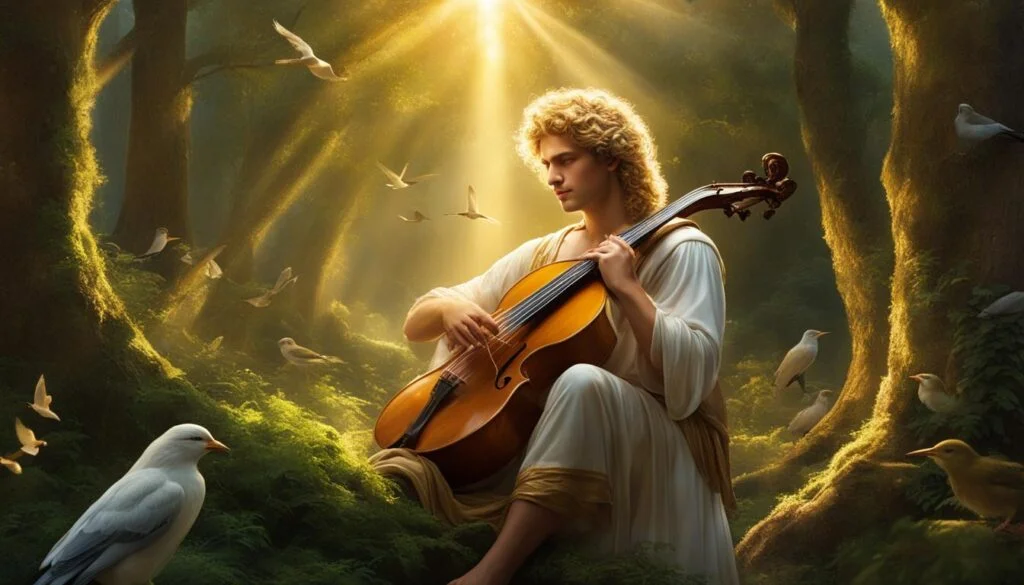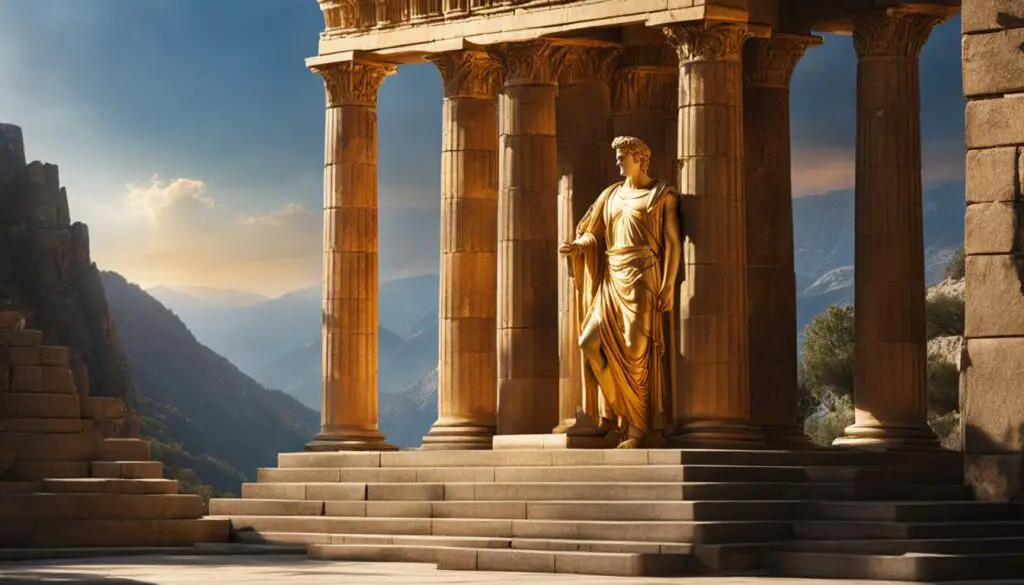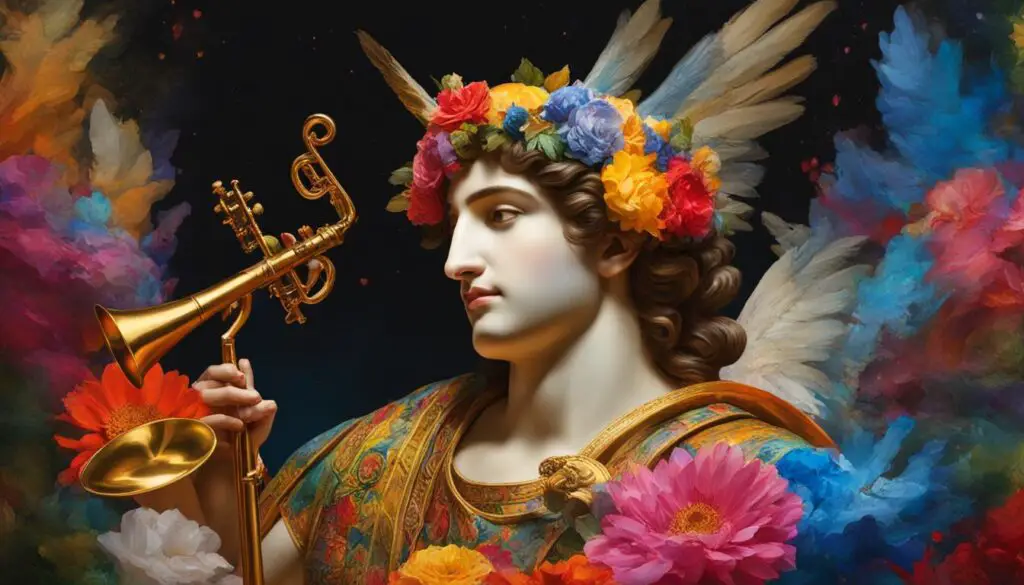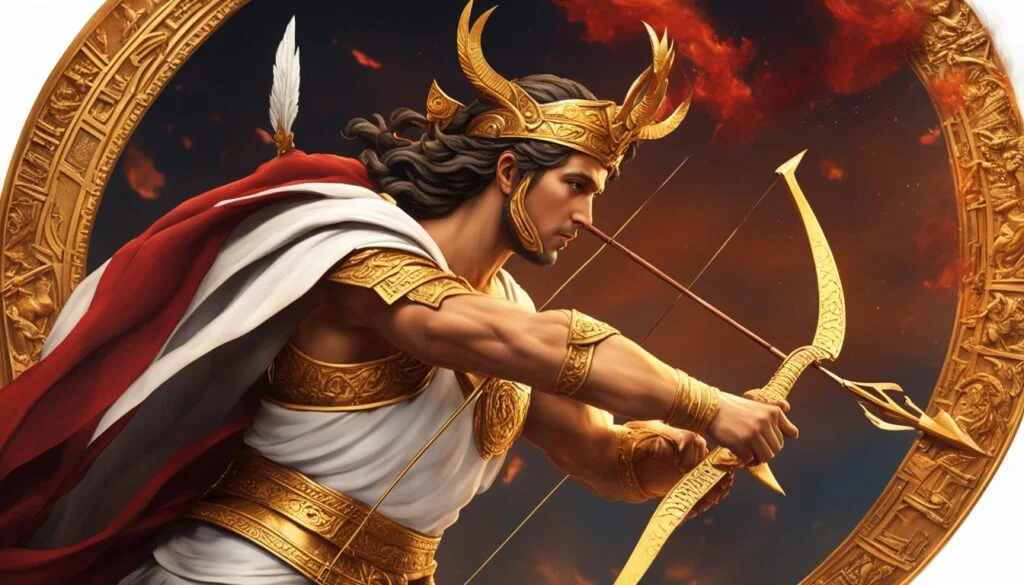Welcome to our exploration of Apollo’s fascinating role in Greek mythology. From his connection to the Temple of Apollo at Delphi to his involvement in the Trojan War, Apollo’s stories and accomplishments have captured the imagination of people for centuries.
Known as the Greek god of music, light, and prophecy, Apollo held a significant place in Greek culture. Let’s delve into the details and unlock the secrets of Apollo’s mythological journey.
Key Takeaways:
- Apollo was a multifaceted deity, encompassing music, prophecy, healing, and more.
- The Temple of Apollo at Delphi held great religious and political significance.
- Apollo’s relationship with the muses and his involvement in the Trojan War were notable aspects of his mythology.
- The Oracle at Delphi, connected to Apollo, served as a renowned source of prophecies.
- Apollo’s influence extended to the realms of art and music, making him a patron of creativity.
The Temple of Apollo at Delphi
The Temple of Apollo at Delphi holds a significant place in Greek mythology and history. It was a sacred sanctuary dedicated to Apollo, the Greek god of music, light, and prophecy. The temple was also the dwelling place of the Oracle of Delphi, a revered figure who provided guidance and prophecies to those who sought her counsel. This ancient site served as a focal point for both religious and political activities.
The history of the Temple of Apollo spans centuries, with various construction and expansion phases. The earliest known temple dates back to the 7th century BCE, while subsequent renovations and additions were made in the following centuries. The temple gained prominence as a religious center, drawing pilgrims from all over Greece. The Oracle’s prophecies influenced major decisions, including matters of war, colonization, and even personal matters for individuals.
Over time, the Temple of Apollo fell into ruin and was eventually abandoned. It remained hidden until its rediscovery in the 19th century. Today, the temple stands as a testament to the ancient Greek civilization’s architectural prowess and religious devotion. It has been recognized as a UNESCO World Heritage Site, attracting visitors who are captivated by its historical significance and the mysteries surrounding the Oracle of Delphi.
Ancient Delphi: A Sacred Sanctuary
- The Temple of Apollo at Delphi was a sanctuary dedicated to Apollo, the Greek god of music, light, and prophecy.
- It housed the Oracle of Delphi, a priestess through whom Apollo supposedly communicated his prophecies.
- The temple served as a religious and political center, with its Oracle’s prophecies influencing major decisions in ancient Greece.
Rediscovery and UNESCO World Heritage Site
- The Temple of Apollo at Delphi was abandoned and fell into ruin over the centuries.
- It was rediscovered in the 19th century and has since become a designated UNESCO World Heritage Site.
- Visitors can explore the ruins and learn about the mysterious rituals and beliefs of ancient Greek civilization.
Apollo’s Domains and Roles

When it comes to the domains and roles of Apollo in Greek mythology, we encounter a diverse and fascinating array of responsibilities. Not only is Apollo revered as the god of music, but he also holds the title of god of prophecy and healing. And let’s not forget his association with the sun, which symbolizes his connection to enlightenment and knowledge.
As the god of music, Apollo’s influence resonates throughout Greek culture. He inspires and guides musicians, serving as a patron of the arts. Apollo’s skill as a musician and poet is legendary, and he is often portrayed with a lyre, his instrument of choice. It’s no wonder that music holds such significance in Greek society, as it is believed to create harmony and bring people closer to the divine.
Apollo’s Roles:
- God of music
- God of prophecy
- God of healing
- God of the sun
In addition to his musical prowess, Apollo is also deeply intertwined with prophecy. He possesses the ability to see into the future and communicate the divine will to mortals. The Oracle at Delphi, a priestess serving as Apollo’s conduit, delivers prophecies and advice to those seeking guidance. This connection solidifies Apollo’s reputation as the god of prophecy and highlights his unique ability to bridge the gap between the mortal and divine realms.
Lastly, as the god of healing, Apollo’s presence brings comfort and restoration. He is often invoked to bring about healing and deliverance from ailments. The ancient Greeks believed that Apollo held the power to cure diseases and bring about physical and spiritual well-being.
Indeed, Apollo’s domains and roles in Greek mythology are vast and far-reaching. From his influence on music and art to his ability to provide guidance and healing, Apollo’s legacy continues to inspire and captivate us to this day.
Apollo’s Relationships and Stories
When exploring the rich mythology of Apollo, we encounter fascinating stories and significant relationships that shaped his role in Greek culture. Let’s delve into some of these captivating tales.
Apollo and the Muses
The muses, the goddesses of inspiration, were intimately connected to Apollo. As the god of music and poetry, Apollo found his greatest source of creative inspiration through these ethereal beings. He would often seek their company, engaging in musical performances and poetic recitations. The muses, in return, lavished him with artistic brilliance, enriching his compositions and sparking his imagination.
Apollo and Daphne
One of Apollo’s most renowned stories is his ill-fated pursuit of Daphne, a nymph and the daughter of a river god. Apollo, driven by his infatuation, relentlessly pursued Daphne, who, in her desperation to escape his advances, called upon her father for help. To protect his daughter, Daphne’s father transformed her into a laurel tree. Apollo, realizing the futility of his pursuit, declared the laurel tree sacred and forever intertwined himself with its symbolism.
Apollo and the Trojan War
Apollo played a significant role in the Trojan War, shaping its outcome through his involvement with the Trojans. As a divine protector of the city, Apollo guided and supported its leaders, including the Trojan prince, Hector. He lent his favor to the Trojan archers, granting them deadly accuracy with their bows. Apollo’s participation in this epic conflict showcased his immense power and influence, solidifying his legacy as a revered warrior god.
Apollo’s relationships and stories illuminate his multifaceted nature and shed light on the profound impact he had in Greek mythology. From his connection with the muses, who fueled his artistic brilliance, to his ill-fated pursuit of Daphne and his involvement in the Trojan War, Apollo’s tales continue to captivate and inspire us.
Apollo and the Oracle at Delphi

One of the most intriguing aspects of Apollo in Greek mythology is his connection to the Oracle at Delphi. This sacred site was home to the Pythia, a priestess who served as Apollo’s oracle and delivered prophecies to those seeking guidance. The Oracle at Delphi was renowned for its accuracy and was consulted by people from all walks of life, including kings, soldiers, and commoners. The Pythia would enter a trance-like state, often induced by inhaling fumes rising from a chasm, and would then deliver cryptic messages believed to be the words of Apollo himself.
The prophecies given by the Pythia were highly respected and influential, shaping important decisions and events in Greek society. People traveled from far and wide to seek Apollo’s wisdom through the Oracle at Delphi, hoping to gain insight into matters of war, politics, and personal life. The prophecies were open to interpretation, often requiring skilled priests or interpreters to decipher their true meaning. This added an air of mystery and excitement to the process, as people eagerly awaited the Pythia’s cryptic pronouncements.
Divine Communication
- The Oracle at Delphi served as a crucial link between mortals and the divine realm.
- It was believed that Apollo himself spoke through the Pythia, guiding and enlightening those who sought his counsel.
- Visiting the Oracle was a deeply spiritual experience, with pilgrims undergoing purification rituals before entering the sacred site.
- The prophecies delivered by the Pythia were seen as a direct line of communication from the gods, offering glimpses into the future and providing guidance for important decisions.
Apollo’s association with the Oracle at Delphi solidified his reputation as the god of prophecy and his ability to bridge the gap between the mortal and divine realms. The Oracle’s influence and significance endured for centuries, making it one of the most revered and sought-after oracles of ancient times.
Apollo and Art, Music, and Poetry

Apollo’s influence extended beyond his roles as a god of light, prophecy, and healing. He held a special place in Greek culture as the patron of the arts, inspiring and guiding musicians, poets, and artists. His affinity for creativity and beauty made him a revered figure in the realm of art.
Apollo’s Connection to Music
Apollo’s skill as a musician was renowned throughout the ancient world. He was often depicted holding a lyre, a musical instrument associated with him. Apollo’s mastery of music inspired countless musicians, and his guidance was sought after by those aspiring to create harmonious melodies.
Apollo’s Influence on Poetry
In addition to his musical abilities, Apollo was also a skilled poet. His poetic prowess added an element of elegance to his character. Apollo’s verses were filled with imagery and emotion, capturing the essence of the human experience. Poets sought his inspiration and guidance, hoping to create works that reflected the beauty and depth of Apollo’s own compositions.
Apollo’s Impact on Art
Apollo’s connection to art went beyond music and poetry. He was regarded as a muse for artists, providing them with creative inspiration. Many sculptures and paintings were dedicated to Apollo, showcasing his physical beauty and noble presence. Artists drew upon his divine qualities to create works that embodied the ideals of perfection and aesthetics.
Through his association with music, poetry, and art, Apollo left a lasting legacy in the realms of creativity and human expression. His influence on the arts continues to inspire and captivate audiences even to this day.
Conclusion
Apollo, the Greek god of music, prophecy, healing, and more, has left an indelible mark on Greek mythology. His multifaceted nature and numerous accomplishments have made him a significant figure in Greek culture.
From his association with the Temple of Apollo at Delphi and his role as the god of the sun, to his relationships with the muses and his involvement in the Trojan War, Apollo’s stories and exploits showcase his diverse domains and roles.
Whether it was his connection to the Oracle at Delphi, his patronage of art and music, or his embodiment of beauty and knowledge, Apollo continues to captivate and inspire us as the epitome of the Greek god. His presence in Greek mythology serves as a reminder of the power of creativity, inspiration, and the pursuit of enlightenment.
FAQ
What did Apollo Do in Greek Mythology?
Apollo played a significant role in Greek mythology, being the god of music, light, prophecy, healing, and more. He was known for his connection to the Temple of Apollo at Delphi, his association with the sun, his relationships with the muses, and his involvement in the Trojan War.
What is the Temple of Apollo at Delphi?
The Temple of Apollo at Delphi was a sacred sanctuary dedicated to Apollo and served as the dwelling place of the Oracle of Delphi. It was a place of great significance, both politically and religiously, where people sought guidance and prophecies from the Oracle. The temple is now a UNESCO World Heritage Site.
What were Apollo’s domains and roles?
Apollo was not only the god of music and light but also the god of prophecy, healing, and more. He was associated with the sun, symbolizing his connection to enlightenment and knowledge. Apollo’s skill in music, poetry, and prophecy made him a revered figure in Greek culture.
What were some of Apollo’s notable relationships and stories?
Apollo was closely associated with the muses, who were his artistic inspiration and companions. The story of Apollo and Daphne highlights his pursuit of love and Daphne’s transformation into a laurel tree to escape him. Apollo’s involvement in the Trojan War showcased his role as a divine protector and warrior.
What was Apollo’s connection to the Oracle at Delphi?
Apollo’s connection to the Oracle at Delphi was significant. The Pythia, a priestess serving as Apollo’s oracle, would deliver prophecies and advice to those seeking guidance. Apollo’s association with the Oracle solidified his reputation as the god of prophecy and his ability to communicate between the divine and mortal realms.
How did Apollo influence art and music?
Apollo was considered the patron of the arts, inspiring and guiding musicians, poets, and artists. His skill as a musician and poet was legendary, and he was often depicted with a lyre, a musical instrument associated with him. Apollo’s connection to art and music emphasized the importance of creativity and the pursuit of beauty in Greek culture.
What was Apollo’s role in Greek mythology?
Apollo, the multifaceted Greek god, played a vital role in Greek mythology. He was revered as the god of music, prophecy, healing, and more, and his stories and accomplishments left a lasting impact on Greek culture. Apollo embodied the ideals of beauty, knowledge, and inspiration.




